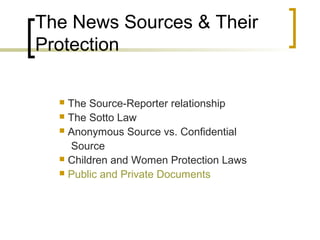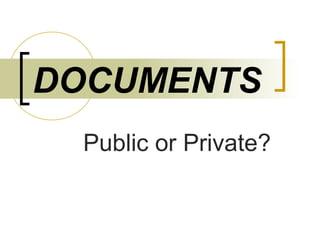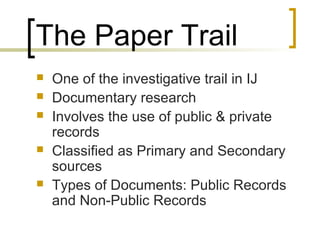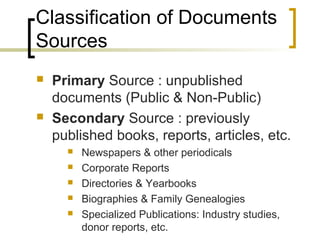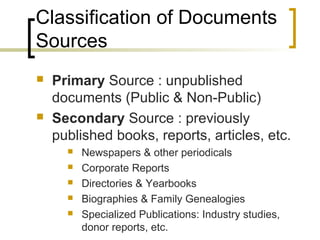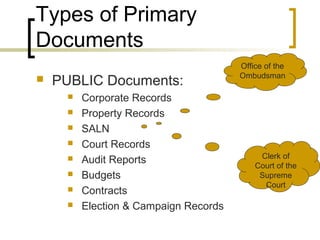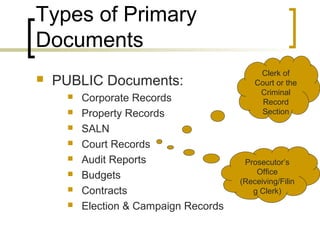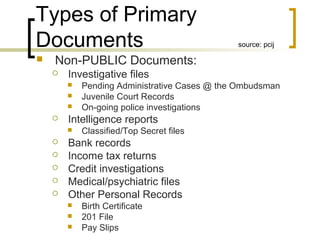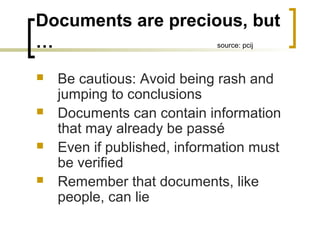Public and-private-documents
- 1. The News Sources & Their Protection ’ü« The Source-Reporter relationship ’ü« The Sotto Law ’ü« Anonymous Source vs. Confidential Source ’ü« Children and Women Protection Laws ’ü« Public and Private Documents
- 2. DOCUMENTS Public or Private?
- 3. The Paper Trail ’ü« One of the investigative trail in IJ ’ü« Documentary research ’ü« Involves the use of public & private records ’ü« Classified as Primary and Secondary sources ’ü« Types of Documents: Public Records and Non-Public Records
- 4. Classification of Documents Sources ’ü« Primary Source : unpublished documents (Public & Non-Public)
- 5. Classification of Documents Sources ’ü« Primary Source : unpublished documents (Public & Non-Public) ’ü« Secondary Source : previously published books, reports, articles, etc.
- 6. Classification of Documents Sources ’ü« Primary Source : unpublished documents (Public & Non-Public) ’ü« Secondary Source : previously published books, reports, articles, etc. ’ü« Newspapers & other periodicals ’ü« Corporate Reports ’ü« Directories & Yearbooks ’ü« Biographies & Family Genealogies ’ü« Specialized Publications: Industry studies, donor reports, etc.
- 7. Newspapers
- 8. Classification of Documents Sources ’ü« Primary Source : unpublished documents (Public & Non-Public) ’ü« Secondary Source : previously published books, reports, articles, etc. ’ü« Newspapers & other periodicals ’ü« Corporate Reports ’ü« Directories & Yearbooks ’ü« Biographies & Family Genealogies ’ü« Specialized Publications: Industry studies, donor reports, etc.
- 10. Classification of Documents Sources ’ü« Primary Source : unpublished documents (Public & Non-Public) ’ü« Secondary Source : previously published books, reports, articles, etc. ’ü« Newspapers & other periodicals ’ü« Corporate Reports ’ü« Directories & Yearbooks ’ü« Biographies & Family Genealogies ’ü« Specialized Publications: Industry studies, donor reports, etc.
- 11. Directories
- 12. Directories
- 13. YearBooks
- 14. Classification of Documents 1- Helps you know: Sources Ō¢Ī the subject What is secondary Ō¢Ī the law/procedures sources for? Ō¢Ī the structures and ’ü« Primary Source : unpublishedprocesses documents 2- So you know how ’ü« Secondary Source : previouslyto proceed published books, reports, articles, etc. ’ü« Newspapers & other periodicals ’ü« Corporate Reports ’ü« Directories & Yearbooks ’ü« Biographies & Family Genealogies ’ü« Specialized Publications: Industry studies, donor reports, etc.
- 15. Types of Primary Documents Company ’ü« PUBLIC Documents: websites, publications ’ü« Corporate Records ’ü« Property Records SE ’ü« SALN C ’ü« Court Records ’ü« Audit Reports ’ü« Budgets ’ü« Contracts ’ü« Election & Campaign Records
- 16. Types of Primary Documents AssessorŌĆÖs ’ü« PUBLIC Documents: Office ’ü« Corporate Records ’ü« Property Records Registry ’ü« SALN of Deeds ’ü« Court Records ’ü« Audit Reports ’ü« Budgets ’ü« Contracts ’ü« Election & Campaign Records
- 17. Types of Primary Documents Office of the Ombudsman ’ü« PUBLIC Documents: ’ü« Corporate Records ’ü« Property Records ’ü« SALN ’ü« Court Records Clerk of ’ü« Audit Reports Court of the ’ü« Budgets Supreme Court ’ü« Contracts ’ü« Election & Campaign Records
- 18. Types of Primary Documents Clerk of ’ü« PUBLIC Documents: Court or the Criminal ’ü« Corporate Records Record ’ü« Property Records Section ’ü« SALN ’ü« Court Records ’ü« Audit Reports ProsecutorŌĆÖs Office ’ü« Budgets (Receiving/Filin ’ü« Contracts g Clerk) ’ü« Election & Campaign Records
- 19. Types of Primary Documents ’ü« PUBLIC Documents: ’ü« Corporate Records ’ü« Property Records ’ü« SALN COA ’ü« Court Records ’ü« Audit Reports ’ü« Budgets LGU ’ü« Contracts ’ü« Election & Campaign Records
- 20. Types of Primary Documents ’ü« PUBLIC Documents: ’ü« Corporate Records ’ü« Property Records ’ü« SALN ’ü« Court Records ’ü« Audit Reports DBM ’ü« Budgets ’ü« Contracts LGU ’ü« Election & Campaign Records
- 21. Types of Primary Documents ’ü« PUBLIC Documents: ’ü« Corporate Records ’ü« Property Records ’ü« SALN Contractors ’ü« Court Records Agency LGU ’ü« Audit Reports Legislative ’ü« Budgets Council ’ü« Contracts ’ü« Election & Campaign Records
- 22. Types of Primary Documents ’ü« PUBLIC Documents: ’ü« Corporate Records ’ü« Property Records ’ü« SALN ’ü« Court Records ’ü« Audit Reports COMELEC ’ü« Budgets ’ü« Contracts ’ü« Election & Campaign Records
- 23. Types of Primary Documents source: pcij ’ü« Non-PUBLIC Documents: ’éĪ Investigative files ’ü« Pending Administrative Cases @ the Ombudsman ’ü« Juvenile Court Records ’ü« On-going police investigations ’éĪ Intelligence reports ’ü« Classified/Top Secret files ’éĪ Bank records ’éĪ Income tax returns ’éĪ Credit investigations ’éĪ Medical/psychiatric files ’éĪ Other Personal Records ’ü« Birth Certificate ’ü« 201 File ’ü« Pay Slips
- 24. When youŌĆÖre denied a public record ŌĆ” source: pcij ’ü« Assert your right to information. (When laws guarantee access) ’ü« Follow-up. Follow-up. Follow-up. ’ü« Write a demand letter to the agency and quote the law. ’ü« If there are disciplining agencies, let the instance known to them. ’ü« Another person or office could have a copy. Remember that these documents often have more than one copy.
- 25. Obstacles to access to information remain source: pcij ’ü« Culture of secrecy ’ü« Political intervention ’ü« Lack of public information about ŌĆ” ’ü« the right to information ’ü« procedures to access information ’ü« Unclear/undefined laws and procedures ’ü« Inadequate/undeveloped information infrastructure
- 26. Documents are precious, but ŌĆ” source: pcij ’ü« Be cautious: Avoid being rash and jumping to conclusions ’ü« Documents can contain information that may already be pass├® ’ü« Even if published, information must be verified ’ü« Remember that documents, like people, can lie

